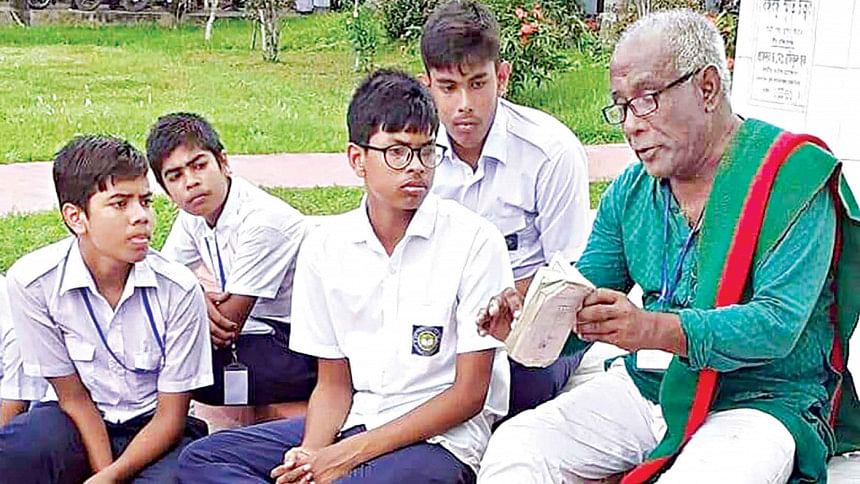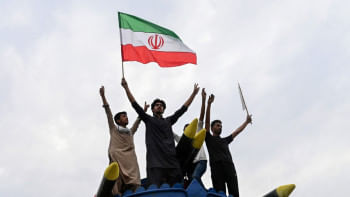Indomitable March: A roving treasure trove of war stories

When parents and teachers alike bemoan that children and young students know little about the Liberation War, one freedom fighter has taken it upon himself to be a roving educator on the battles of 1971.
For this, 69-year-old Bimol Paul, has earned the tag of "Muktijudder Golper Feriwala" and is now well known both in Mymensingh and outside the district.
Bimol has so far written five books on the war -- "Telikhali Juddho", "Ekattorer Genocide O Pakistan Style", "Rajapahar Juddho in Sherpur", "Chhotoder Muktijuddho O Bangabandhur Golpo", and "Bangabandhu O Mymensingh".
He visits schools in and around Mymensingh to narrate stories of the Liberation War and distributes his books to primary students for free.
"To illustrate what I'm describing, I first draw pictures of tanks, Pakistani soldiers, fighter jets and freedom fighters before starting the story," said Bimol on the classes he takes.
Bimol has so far visited over 100 educational institutions, mostly primary schools, and has been distributing the books since 2016.
He took a loan of Tk 3 lakh at seven percent interest against his monthly freedom fighter's allowance to print 20,000 copies of "Chhotoder Muktijuddho O Bangabandhur Golpo".
Bimol also shares his experience as a war hero in a class for army officers on a particularly brave battle won by freedom fighters at Telikhali in Mymensingh's Haluaghat upazila in 1971.
As word of his initiative had spread, in 2016, he received a call from a commanding officer at the National Defence College in Dhaka.
The officer sought Bimol's support in taking a class on the Telikhali battle when once a year, army officers are brought to the area to view the spot during their one-year course on Liberation War Studies.
"I agreed and along with my fellow freedom fighters Abdus Salam, Abdul Gani, and Havilder Mesbah Uddin, have been participating in it since 2016."
Bimol added that his is the only instance of a freedom fighter being directly involved in providing battlefield studies in the country.
He had first gathered experience in battlefield studies at a programme organised on it at Mymensingh Circuit House by the then General Commanding Officer of 19-Infantry Division Major General M Harun-Ar-Rashid, Bir Pratik, in 1999.
BIMOL'S WAR
Inspired by the mass upsurge in 1969, Bimol joined the Liberation War and went to India in May to take training, returning in July 1971.
He mainly fought in bordering Nalitabari in Sherpur and Phulpur and Haluaghat upazilas in Mymensingh under Sector 11, which had a force of 10,000 freedom fighters, led by Commander Major Abu Taher.
Bimol recalled memories of Telikhali, one of the fiercest battles in Mymensingh region, where freedom fighters launched attacks on the Pakistani army base there.
"It was a planned attack led by Colonel Roghubon Singh, commander of the joint forces, while Commander Abul Hashem assisted the fight," said Bimol.
"The attack was conducted from the back of the Pakistani camp. First, we took position 300 yards away from the camp and I was a member of the first attacking team.
"Around 3:55am on November 3, the attack began and it continued for only 10 minutes."
Hearing news of the attack on the camp, the Pakistan army -- with artillery support from another camp in Haluaghat -- started shelling in those early hours of morning.
"A bomb fell just beside the camp and I, along with two others, were injured by the bomb splinters," Bimol recalled.
The camp was captured by the freedom fighters by morning.
Eight freedom fighters and 21 Indian soldiers were killed in the battle, he said, in addition to 70 Pakistan army soldiers who died in the fight with the only survivor, a 22-year-old ranger who surrendered.
After primary treatment at the camp, Bimol recuperated at his brother-in-law Ajit Kumar Das' home, who had taken refuge at Barengapara in the West Garo Hills district of Meghalaya, India.
On his return home, he was among a team of 35 freedom fighters who were assigned on verbal order by Commander Abul Hashem to Phulpur Police Station for five days. Bimol acted as a sub-inspector there before returning to Mymensingh city on December 12.
Bimol is exceptional in his work on narrating the events of the Liberation War and deserves a national award, said Zia Uddin Ahmed, ex-assistant commander of Mymensingh district Muktijuddha Sangsad.
AFTER THE WAR
Born to Arabindu Paul and Shuvashini Paul in Mymensingh city in 1953, Bimol was only 18 years old, a first-year HSC student, when he went to the Liberation War.
After surrendering arms to Syed Nazrul Islam, one of the four national leaders, in March 1972, Bimol returned to his father's grocery shop in the city's Natun Bazar.
Bimol's father had died of old-age complications during the war, when he had taken refuge at his in-laws' house in Kolkata.
Facing business losses, father-of-three Bimol later shifted his business to the city's Thanar Ghat and started a tea stall in 1990, which he ran for 20 years.
Bimol now assists his two sons in their business Bebek Telecom in the same area.
"I expect nothing from society as I am satisfied with what I got from the state and its people as well," he said.
Bimol is involved with many local organisations including the Mymensingh Sahitya Sangsad, the Sector Commanders Forum, Mymensingh, and BD-Clean Mymensingh.
He was one of a 10-member team who performed the funerals of 23 persons who died of Covid-19 in the district.
Of these deaths, three were freedom fighters including one Bir Pratik, said Ali Yusuf, the team leader.
Bimol has received local and regional recognition for his work from the district and divisional administrations, among others, and has been popularly dubbed the "Muktijuddher Golper Feriwala".
For his presentations on the war, the 19-Infantry Division also honoured Bimol and his three fellow freedom fighters with symbolic honours, said a smiling Bimol.

 For all latest news, follow The Daily Star's Google News channel.
For all latest news, follow The Daily Star's Google News channel. 



Comments